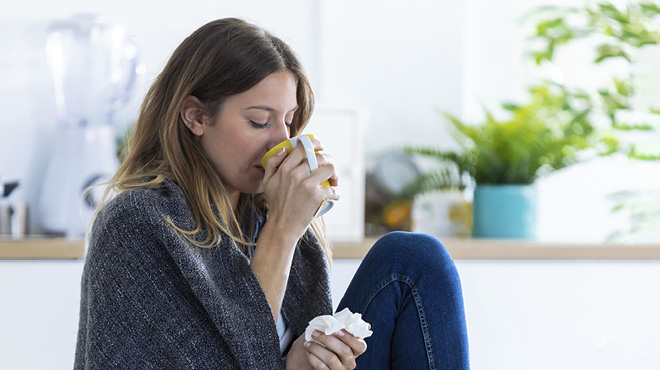Recent Posts
5 things to know during upper respiratory illness season

As winter and the holiday season bring gatherings with friends and family, they also bring an increase in upper respiratory infections. Cases of influenza and respiratory syncytial virus (RSV) are on the rise, with other conditions like COVID-19 and strep throat likely not far behind.
Here are five things you need to know to guide you through this year's upper respiratory infection season.
For most people, respiratory illnesses can be treated at home.
If you have respiratory symptoms and aren't high-risk, you probably don't need to get tested or make an appointment with your healthcare professional. Getting plenty of rest, drinking fluids and using over-the-counter medications can help you feel better and aid recovery.
For most people, testing for influenza or other infections won't change your treatment plan. Clinic-based testing for infections, such as influenza and strep, is recommended only for high-risk patients or those who meet certain criteria.
Those at increased risk include people:
- Who are immunocompromised.
- Who are 65 or older.
- Who are pregnant.
- With other complex health conditions.
Use Primary Care On Demand for quick upper respiratory symptom assessment and video visits.
Download the Mayo Clinic Primary Care On Demand app for upper respiratory care whenever you need it — in the evening, on weekends and holidays, or when same-day appointments fill up. Primary Care On Demand is available 24/7/365 for patients ages 3 and older living or traveling in Iowa, Minnesota or Wisconsin.
Through the app, you'll answer assessment questions about your symptoms before choosing to move on to a video visit with a physician. Often you can connect with a physician in under 30 minutes, and most people wait less than 10 minutes for a video visit.
Primary Care On Demand syncs with your Mayo Clinic health record, so all of your health information stays in one place. This care team can also order labs or tests and submit prescriptions to your preferred pharmacy.
Other assessment and care options for upper respiratory symptoms include the Primary Care Nurse Triage Line and Express Care, which offers both virtual and in-person appointments.
Take a home antigen test to check for COVID-19.
If you have COVID-19 symptoms or have been exposed to COVID-19, home antigen tests are the fastest, most convenient and least expensive way to get tested.
Unlike PCR tests, antigen tests are widely available through commercial pharmacies and other stores. You can also order free home antigen tests through the Department of Health and Human Services.
Antigen tests don't require a clinic appointment. They provide fast results and can be done at home.
You only need to report your COVID-19 home test results to your primary care professional if you're interested in receiving treatment. You can self-report a positive test result through the COVID-19 home antigen attestation questionnaire in the patient portal.
If you test positive for COVID-19, you don't always need oral antiviral treatment (Paxlovid).
Unless you're at high risk for complications, you likely won't benefit from oral antiviral treatment with Paxlovid. If you're low risk, this medication doesn't shorten the time you'll experience symptoms or reduce your risk of hospitalization. Taking Paxlovid can actually make low-risk patients feel worse.
Researchers also don't know if Paxlovid reduces the risk of long COVID. For people who could benefit from taking Paxlovid, this treatment is no longer provided to patients by the government, which means there is a cost. Check your insurance coverage to understand how much you'll be expected to pay for Paxlovid.
Prevention is the best protection.
Following simple prevention guidelines can go a long way toward protecting you and your family from illness.
Make sure you wash your hands, avoid prolonged contact with people who are sick and stay current on your recommended vaccines, especially for influenza and COVID-19.
If you become ill, help protect others by staying home until your symptoms improve. Wear a high-quality, well-fitting mask if you must be in contact with others and follow isolation guidelines for returning to work or school.
Next steps:
- Learn what you should know about RSV and the RSV vaccine.
- Find out why your sinus headache may not be what you think.
- Get tips about what to do if you have COVID-19 or the flu.
- Read 7 ways to combat coughs and colds.
Jill Lenhart, M.D., is a Family Medicine physician in Chippewa Falls, Wisconsin.




